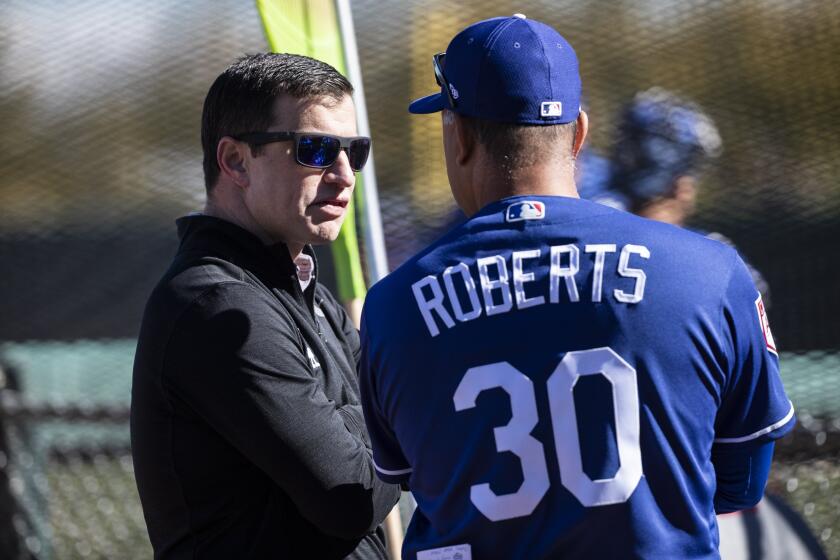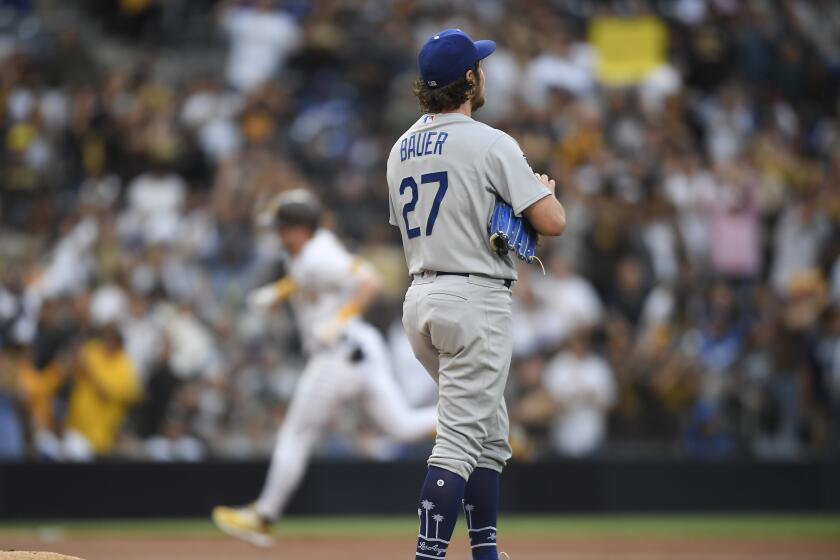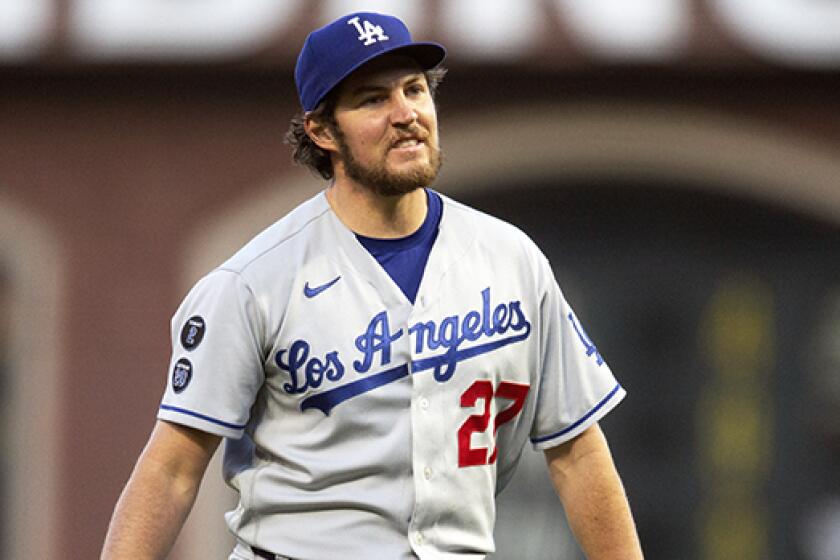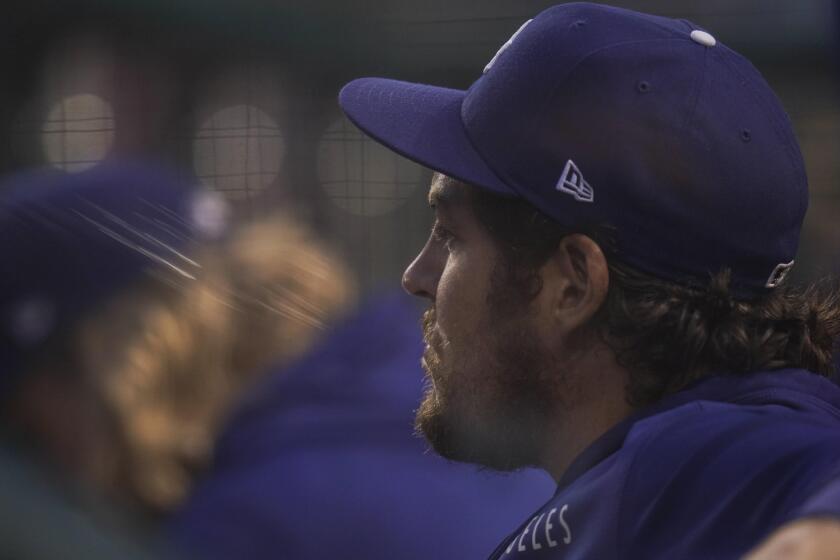A wrinkle in MLB’s domestic violence policy may complicate a Trevor Bauer suspension
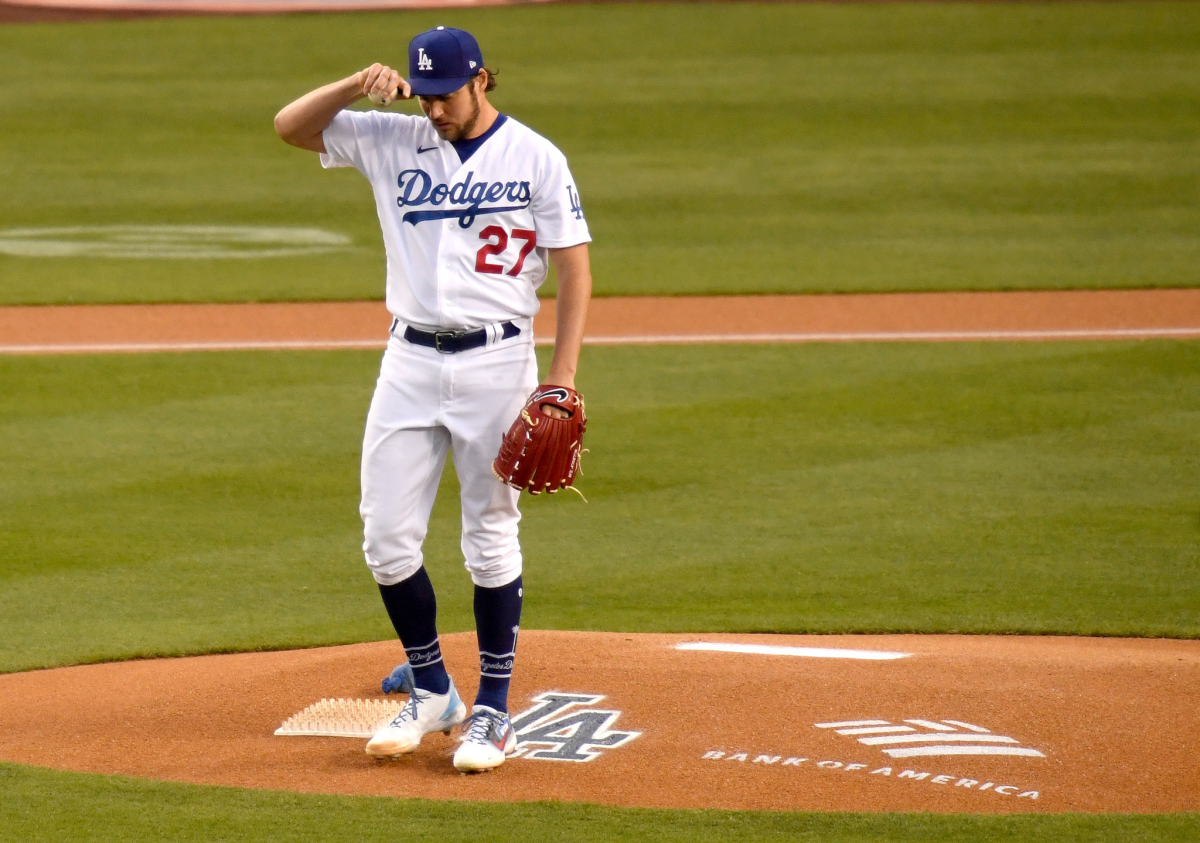
- Share via
In the NFL, the standard player suspension for domestic violence or sexual assault cases is six games. The NFL reserves the right to adjust the length of a suspension based on the circumstances of each case, but the baseline for discipline is six games — about 35% of a season.
There is no similar baseline for such suspensions in Major League Baseball. In the six years of baseball’s domestic violence and sexual assault policy, the commissioner’s office and player representatives have reached individual agreements for the 14 player suspensions levied under the policy. The suspensions have ranged from 15 games to 162 games — that is, from 9% to 100% of a season.
The possibility that Dodgers pitcher Trevor Bauer could be suspended under that policy — and could be the first player to appeal rather than settle — could raise a thorny question for an independent arbitrator: Just what is the appropriate length of a suspension?
“There’s no precedent,” said Jay Reisinger, a Pittsburgh attorney who has represented players suspended under baseball’s domestic violence policy. “When there’s no precedent, it’s hard to gauge what the appropriate penalty is.”
Bauer has not pitched for the Dodgers since June 28, the day before a woman accused him of sexual assault. Bauer contends his two sexual encounters with the woman were consensual.
The Los Angeles County district attorney’s office has yet to decide whether to pursue criminal charges against Bauer. MLB put Bauer on leave July 2 and has conducted its own investigation.
Andrew Friedman, the Dodgers’ president for baseball operations, said the team is waiting to see what the league does with Trevor Bauer before commenting on pitcher.
The terms of MLB-negotiated settlements cannot be used as precedent in an arbitration hearing.
An arbitration hearing could be a wild card in baseball’s winter, putting Commissioner Rob Manfred under unusual scrutiny.
Manfred could not defend a harsh suspension of Bauer simply by arguing the length of the suspension was in line with past punishments for domestic violence and sexual assault. On the other hand, Bauer could not plead for leniency just by arguing his suspension was overly long compared with other suspensions under the policy.
And the courts, not the arbitrator, might have the final word.
“A likely scenario, because of the lack of precedent, is that whatever he rules is going to be appealed, by one side or the other,” said Joe Longo, a player agent who teaches sports law at Loyola Law School and USC.
In sports and in the law, considering precedent means ensuring similar offenses get similar punishments. As an MLB example, a 10-game suspension for applying a foreign substance to the ball might seem to be a light sentence, as a pitcher might miss only one start. However, given that 10 games long has been the standard punishment, MLB adopted that standard in its crackdown this season, rather than risk an arbitrator overturning a longer suspension on the basis of precedent.
For pitcher Trevor Bauer, the woman who accused him of sexual assault, the Dodgers and MLB, uncertain times lie ahead. Here’s an explainer.
If Bauer were to be suspended and were to appeal, an arbitrator would be tasked with deciding whether a suspension is in accordance with league policy. Yet, the domestic violence and sexual assault policy says nothing about how long a suspension should be. The arbitrator would not be allowed to consider suspensions reached via negotiated settlements as precedent.
“Neither side is going to be arguing, ‘You have to follow this ruling’ or ‘You have to follow that ruling’ because there is no ruling,” Longo said.
“You’ve got to interpret what’s written in the policy. Both sides will try to put their explanation on the policy, and then the arbitrator has to make a decision.”
The policy does call for industry-wide domestic violence and sexual assault policies “comparable both in terms of scope and discipline for their respective employees, managers, executives, and owners.” The league could argue that a precedent was set in 2019 by the four-month suspension of San Francisco Giants president Larry Baer, whose wife fell to the ground after he reached for her cell phone during an argument.
In devising the policy, the league and its players’ association consulted with experts in domestic violence and sexual assault. The decision to tailor suspensions to the circumstances of each case, and to try to negotiate settlements rather than hand down suspensions of a certain length, emerged from those consultations.
“Having a one-size-fits-all policy, or a zero-tolerance policy, is not a great idea,” said Deborah J. Vagins, president of the National Network to End Domestic Violence, one of the nonprofits that worked with MLB and the MLBPA. “We really advocate for a measured, robust approach.
Trevor Bauer won’t pitch again this season, and certainly not again for the Dodgers, who must face the consequences for signing him for years to come.
“If there’s a zero-tolerance policy, and the victim calls 911, and the abuser can lose their entire career and livelihood, it can actually drive down victims disclosing and coming forward. So the survivor not only has to worry about losing the mortgage and all that, but it also can increase the risk of lethality toward you, because the abuser may feel like they’ve got nothing to lose at that point.
“We’re talking about dangerous situations that have to be handled with nuance, [in a way] that encourages reporting and also respects the concerns and privacy and all of the different dynamics of the survivors’ needs.”
Vagins credited MLB for implementing a domestic violence and sexual assault policy that went beyond waving a “zero tolerance” flag and predetermining the length of a suspension.
“They have signaled from the top that they take this very seriously,” she said. “I wouldn’t want anyone to conflate having a nuanced and thoughtful approach with not taking it seriously.”
The policy does call for industry-wide domestic violence and sexual assault policies “comparable both in terms of scope and discipline for their respective employees, managers, executives, and owners.” The league could argue that a precedent was set in 2019 by the four-month suspension of San Francisco Giants president Larry Baer, whose wife fell to the ground after he reached for her cellphone during an argument.
In devising the policy, the union wanted to ensure that an independent arbitrator — not Manfred — would have the final say over any dispute. The league and the union shared an interest in protecting the accusers, investigating allegations as carefully and thoroughly as possible, introducing educational programs about domestic violence and sexual assault for all players and including treatment programs as well as suspensions for players subject to discipline.
Hernández: Trevor Bauer makes a clumsy grab at the playoff spotlight. The Dodgers aren’t amused
Trevor Bauer vowed last month not to be a distraction; instead he chose the eve of the Dodgers-Cardinals playoff game to relaunch his sideshow.
“You’ve got to treat the individual, you can’t just punish them,” David Prouty, general counsel for the union when the policy was negotiated, told the “Sports 360” podcast in 2019. Prouty left the MLBPA in 2017; he declined comment for this story.
According to the policy, the MLB and the union maintain a contract with a “domestic violence services provider” to offer confidential, 24-hour support to players, victims and families in English and Spanish. That hotline, and other “intervention services,” are offered to all affected parties once the commissioner’s office begins an investigation into allegations of domestic violence or sexual assault.
“Remember that the family is still being supported by the player,” Prouty said on a podcast. “It’s not necessarily the most therapeutic way to go about changing things: to have the player both be without a job for some period of time, and be without a paycheck. That can just add to the stress of the situation, rather than take away from it.
“So what we tried to do — and history will judge us — is provide a more comprehensive solution that looked to improving the overall situation, not just punishing a player.”
More to Read
Are you a true-blue fan?
Get our Dodgers Dugout newsletter for insights, news and much more.
You may occasionally receive promotional content from the Los Angeles Times.

